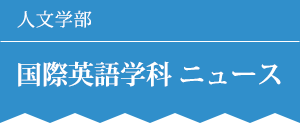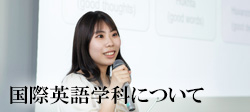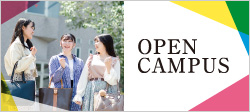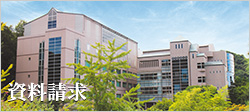One of the real strengths of the curriculum at the Department of International English (KEG) is the sheer range of options of types of classes that students can choose from. There is a very wide range of culture, language, and topic-based classes, and in this article, I would like to talk about one of my personal favorites, Environment & Society.
(国際英語学科のカリキュラムの真の強みの一つは、学生が選択できる授業の種類や選択肢が本当に幅広いことです。文化や言語、特定のトピックに基づいた授業など非常に幅広い科目があります。この記事では、私が個人的に好きなEnvironment & Sociery (環境と社会)の授業について紹介します。)
This course explores many different perspectives on how human society and the natural world connect. So, we look at things like ethics, institutions, and the concept of 'nature'. One great thing about all the classes at KEG is the active learning and smaller group sizes, which means there is always time and space for every student to share their ideas and opinions.
(この授業では、どのように人間社会と自然とが関わり繋がっているのかを様々な視点から考えます。私たちは倫理や公共機関、自然という概念を扱います。国際英語学科の授業の良い点は、アクティブラーニングを取り入れた少人数での授業を行っていることです。そのため、皆がそれぞれの意見を共有し、話し合うことができます。)
Some content of this course is quite challenging, however, one of the methods of teaching I use is a huge range of activity types. One week the students might be interviewing their family and friends about their impression of photos of imperfect vegetables, the next they might be taking an object from their home and trying to find out where all the different parts come from and how it was made, and in another week they might be asked to be the spokesperson for a tree in a dispute.
(この授業のいくつかの内容はとても難しいものですが、いろいろなスタイルのアクティビティを用いて授業を行います。ある週では、学生たちがそれぞれの家族や友達に不揃い野菜の写真の印象を尋ね、野菜の形が変わったことや生産方法を説明するアクティビティを行ったりします。他にも、これから切られるかどうかの危機的状態にある木の代弁者になって話すと言ったことも行います。)
As we are coming to the end of the semester, the students are in groups working on their 'objects' presentations. They take an ordinary object or idea from the world and discuss it from the various perspectives we have looked at throughout the course. They even create, assign, and grade homework assignments for each other.
(前期の終盤で、学生たちはグループで「オブジェクト・プレゼンテーション」を行います。学生は、日常生活と関係のあるものや考えなどを、授業を通して学んだ様々な視点から議論します。さらに、学生同士で互いに課題を作成し、割り当て、評価を行います。)
I've asked some of the groups to talk about their impressions of the course, what they've learned in researching their own presentations, and why they recommend that high school students consider studying with us here at KEG!
(このコースを履修する学生たちに、授業の印象や学んだこと、そして高校生の皆さんに国際英語学科をお勧めしたい理由を聞いてみました。)
First, we hear from RS and HS, who gave an interesting presentation about Wolves.
In this class, you can think about familiar topics such as protecting the environment, from new and interesting perspectives such as ethics, and anthropocentric and ecocentric approaches. It was an interesting class where I was able to learn how human society and nature interact with each other. We gave a presentation on the theme of whether it is ethically permissible to reintroduce extinct wolves through human intervention and restore the ecosystem, and who has the right to decide on this. It was a difficult topic, but it changed our view of "nature" and was a very meaningful project for us.
(環境への配慮や自然の保護など、今まで一度は考えたことのあるトピックを倫理的な観点や人間主義的観点、それとは対する考えにある環境主義の観点など様々な視点から考え、どのように人間社会と自然が相互に影響し合っているのか学ぶことができた興味深い授業でした。私たちは、絶滅してしまったオオカミを人間の手によって再導入し、生態系を元に戻すことが倫理的に許されるのか、またそれを決める権利は誰にあるのかというテーマでプレゼンテーションを行いました。難しいトピックではありましたが、「自然」に対する見方が変わりとても有意義なものとなりました。)
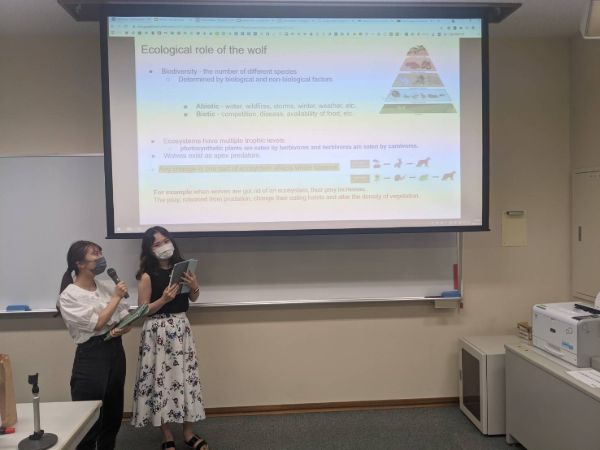
RS & HS tackle the ethical problems of human intervention in ecosystems
Next, we hear from KO and MH, who based their final project around the deceptively tricky issue of french fries!
Throughout this class, we have come to understand how the environment and human society are related to, and influence, each other. We've looked at the basis of our concept(s) of 'nature', and what ethical reasoning looks like when it is applied to the natural environment. We looked at the global phenomenon of french fries, and how monocultural agricultural methods impact society and the environment, mainly from the viewpoint of risk and ethics. It's an interesting chance to think about environmental and social issues not only from Japan but also from a global perspective, which changes the way you look at the world and your daily life. I recommend this course to people who want to break the dull routine of daily life! Let's start by thinking about french fries, and then explore the environment!
(この授業全体を通して、環境と社会がどのように関わり、影響し合っているのか、また何をベースにして「自然」、「環境への善悪のアプローチ」を考えているのかを明確にすることができました。そして、私たちはフライドポテトの世界的な位置づけから、じゃがいもの単一栽培や品種改良がどのように私たちの社会と環境に影響しているのかを、リスクと倫理の観点をメインに分析し発表しました。日本だけでなく、グローバルな視点から環境問題や社会問題について考えることができるので、世界や日々の生活の見方が変わる点が面白く感じます。退屈な変わり映えのしない日々から抜け出したい人は、ぜひまずはフライドポテトから、環境について考えてみましょう。)
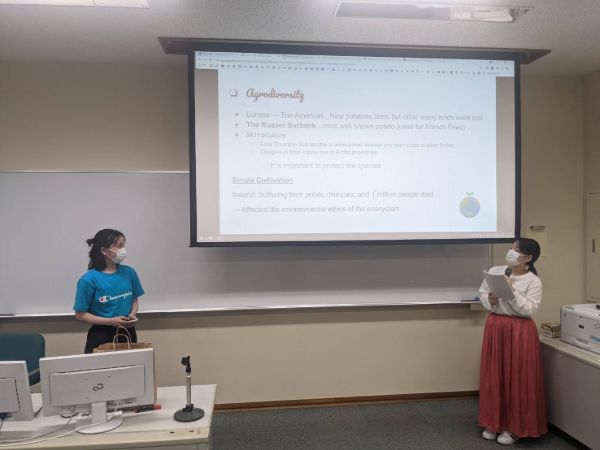
KO & MH explored monocultures and consumer expectations of standardisation
And finally, AH and NK chose the issue of plastic bottles. This familiar topic in standard environmental classes is a great chance to see why this course asks students to go much more deeply into understanding a specific issue and see it from different angles.
(最後に紹介するのは、プラスチックボトル問題について発表したA.H.さんとN.Kさんの感想です。プラスチックボトル問題は環境問題を考える際ありふれた話題ではありますが、このコースではより深く様々な視点から解決策を模索することができます。)
We learned about the intersection of humans and nature through the issue of PET water bottles, which is considered to be a major global problem, from various perspectives. Even though we thought we were familiar with PET bottles, we actually gained a lot of new knowledge by looking at ways of thinking about the environment and society. For example, we learned there are big differences in reasons for buying PET bottles of water between people living in developed countries, and people living in developing countries, where plastic water bottles are very important. So, through the class, we were able to learn new things about seemingly familiar problems.
(世界規模の問題とされるペットボトル水の問題を様々な視点から考え、人間がどのように関わり影響されているのかを学びました。身近なペットボトル水でも社会・環境・考え方の違いで新しい発見があり、多くの知識を得ることができました。例えば、結果としてペットボトル水を買うという行為であっても発展途上国と途上国ではその理由に大きな違いがあり、ペットボトル水の重要性にも違いが見られました。この授業の活動では、身近な問題でも新しい考え方を学ぶことができました。)
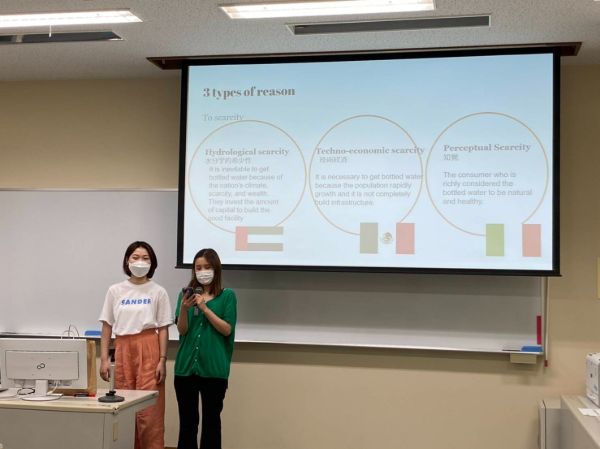
AH & NK looked at how developing and developed countries think about water differently
If you're interested in improving your English and learning about topics like this, and many others, please see our department website, and why not visit one of our Open Campus events! You can hear from not only teachers but also current students!
(英語力をつけたい、このようなトピックについて学びたいと思う高校生の皆さんは、ぜひ国際英語学科のウェブサイトを見たり、オープンキャンパスにも参加してください!先生からだけでなく、在学生からも話を聞けますよ!)
